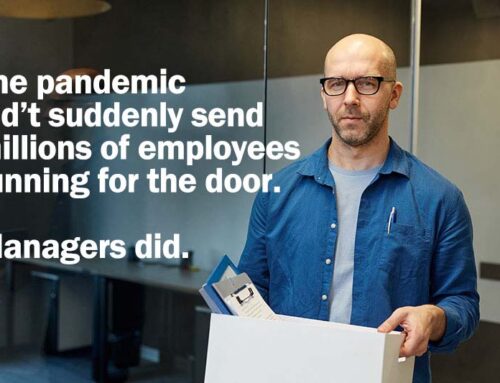As a manager, your job is pretty straightforward: make sure the people on your team do their work as well and as efficiently as possible.
Good managers accomplish this by putting their team members first, keeping their focus on the business (not on their own ego), communicating honestly and frequently, rewarding success, and publicly promoting their teams. They seek qualified candidates who can add to the company culture and bring new perspectives to the business.
Bad managers attempt to lead with indifference and intimidation. They often focus their energies on their own bosses, leaving their teams unguided and unrewarded, and they seek sameness when hiring, not diversity nor inclusion. Poor managers can fail because their employees are not motivated to help them deliver quality and efficiency.
It’s obvious which kind of manager is better for the business. And it should be just as obvious which kind of manager is better for the community.
Because a manager’s influence doesn’t end at 5:00 p.m.
Our workplace experiences affect other parts of our lives. Most people cannot go home and block out everything that happened during the workday. Our frame of mind at work continues to affect us throughout the night and over the weekend.
When we feel good about our work and respected by our bosses, we feel good about ourselves. That sense of well-being cannot help but affect the way we behave outside of work.
People fortunate enough to have good managers feel valued. They get more from their job than a paycheck; they earn self-respect. They go home feeling good about themselves and are proud of the work they do. They are proud of their success and say good things about their companies and their bosses. They feel secure in their jobs, which gives them security in every other part of their lives.
People who are told they have valuable work skills may be inclined to use those skills in other ways, at home and in their communities. Their self-confidence enables them to influence others and to overcome obstacles in their neighborhoods, just as they do in their jobs. They know they are capable and effective because that’s the feedback they get from their bosses and companies. Their managers equip them to accomplish more in and out of the workplace.
People with bad managers don’t enjoy the same emotional and intellectual rewards. They can feel marginalized and undervalued. Their self-esteem can suffer, and they can go home frustrated and angry. They feel expendable, and that lack of security ripples throughout their lives.
When we feel undervalued and disrespected, we need to unwind, to forget the indignities and insults, the unfairness and abuse we experience or witness every day. Our unhappiness at work may spill over into our family relationships. And how can we expect discouraged, angry employees to be suitable role models for their children? What kind of future employees are we raising when all they see growing up is adults’ resentment and disappointment with their jobs?
And who wants to live next door to all that?
Manage your employees like they live next door. Help cultivate in your employees the qualities you’d like to have in a neighbor. Treat them with the same dignity and respect you’d like to receive from a member of your community.
Manage them with honesty and integrity and you won’t have to worry about what they’ll say about you in PTA meetings or at the gym.
To learn more about how to be a successful manager, read Don’t Be a Jerk Manager: The Down & Dirty Guide to Management. It’s the management training you never got, available on Kindle and in paperback from Amazon.com. The audiobook is available from Amazon, Audible and iTunes.
Do you think you might be a jerk manager? Take the quiz!
Photo by Erik Mclean on Unsplash






